Excavation Contractors Charlestown
Find top Excavating Contractor in Charlestown
Get 3 FREE Excavation Companies quotes for your project today! Compare profiles, reviews, accreditations, portfolio, etc... and choose the best service.
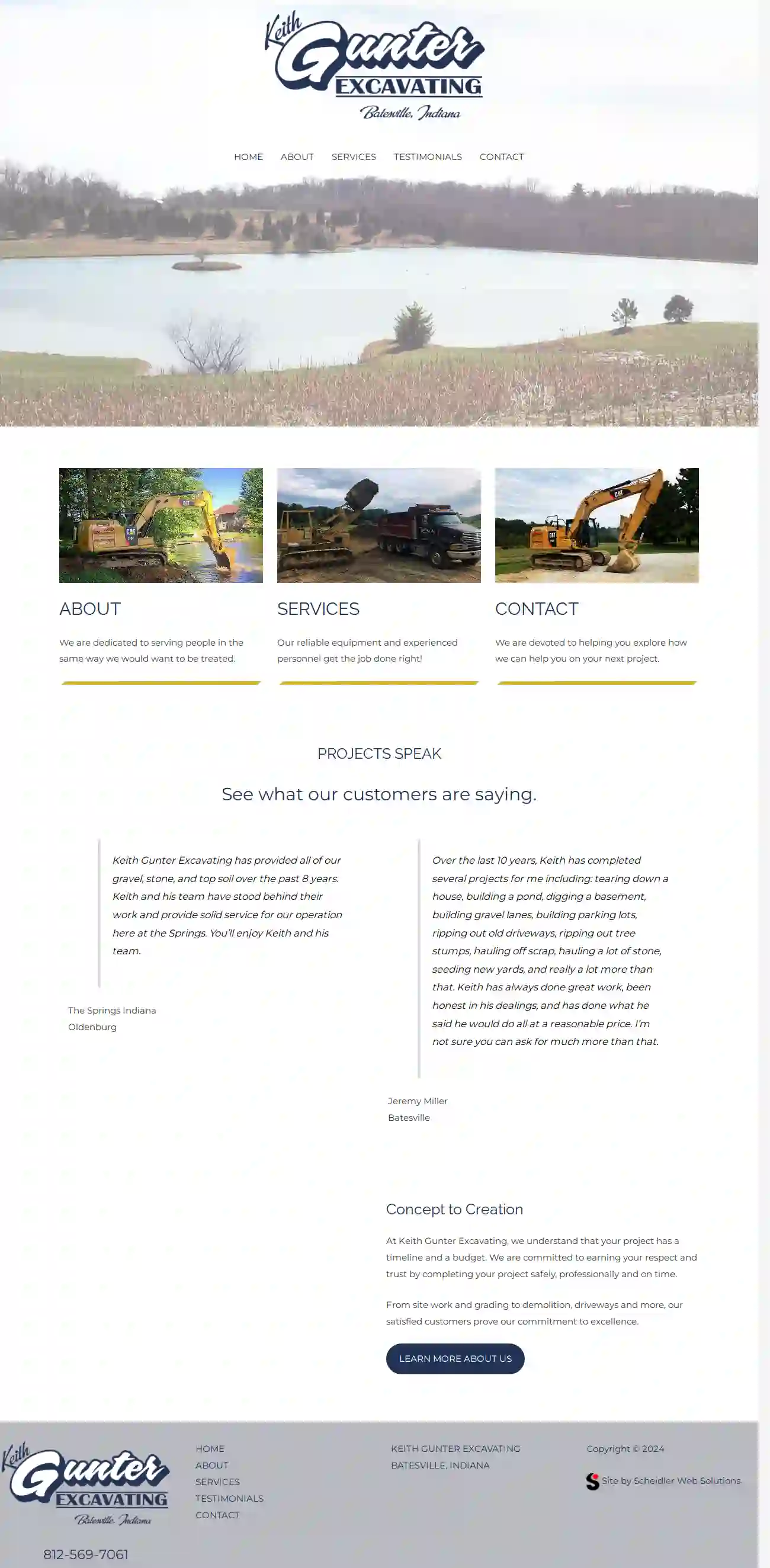
Keith Gunter Excavating LLC
515 reviewsBatesville, USWho We Are. Welcome to Keith Gunter Excavating! Keith Gunter Excavating is a third-generation, family-owned business based in Batesville, Indiana. With nearly 60 years of combined excavating experience, Keith and his team handle the ‘dirty’ work, Abby ‘digs’ handling the books, and the two youngest Gunter girls are ‘entrenched’ with looking cute and having fun. Keith Gunter Excavating offers a full-range of residential and commercial services across Southeastern Indiana. We are qualified to handle a variety of projects and will work hard to ensure you are completely satisfied!
- Services
- Why Us?
- Testimonials
- Gallery
Get Quote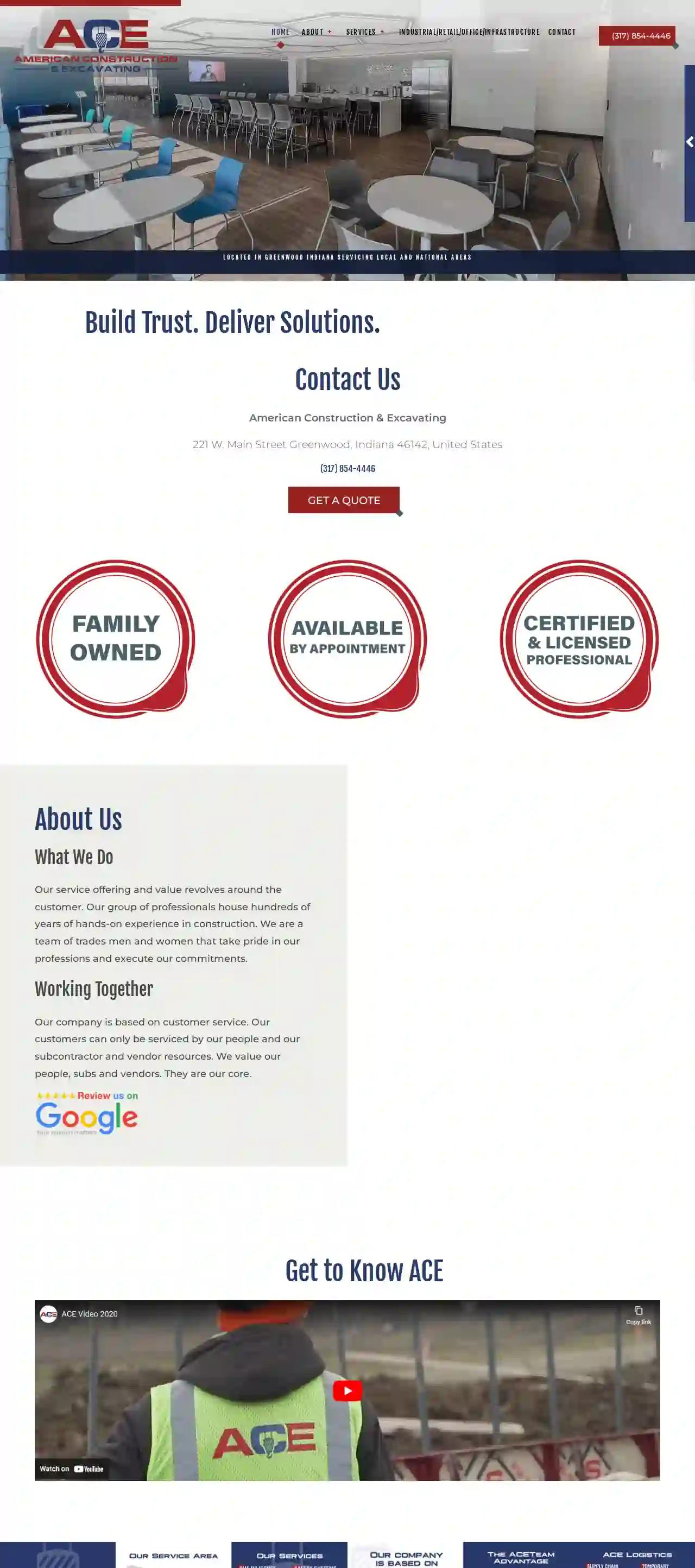
American Construction & Excavating LLC
221 W. Main Street, Greenwood, Indiana 46142, United States, 221 W. Main Street Greenwood, 46142, USAbout Us Our service offering and value revolves around the customer. Our group of professionals house hundreds of years of hands-on experience in construction. We are a team of trades men and women that take pride in our professions and execute our commitments. Working Together Our company is based on customer service. Our customers can only be serviced by our people and our subcontractor and vendor resources. We value our people, subs and vendors. They are our core.
- Services
- Why Us?
- Testimonials
- Gallery
Get Quote
Ghilotti Construction Company
4.85 reviews246 Ghilotti Avenue, Santa Rosa, 95407, USGhilotti Construction: A Legacy of Excellence For over 108 years, Ghilotti Construction has been a trusted name in the Bay Area, renowned for its commitment to hard work, dependability, and community involvement. As a 100% employee-owned company, we take pride in our family tradition of excellence, delivering exceptional general engineering services to a wide range of clients. Our team of experienced professionals is dedicated to providing comprehensive solutions for all your construction needs, from total site preparation and underground utilities to residential and commercial concrete projects. We are also equipped to handle emergency work, ensuring your project stays on track, no matter the circumstances. At Ghilotti Construction, we believe in building strong relationships with our clients, partners, and the communities we serve. We are committed to sustainable practices and strive to leave a positive impact on the environment.
- Services
- Why Us?
- Gallery
Get Quote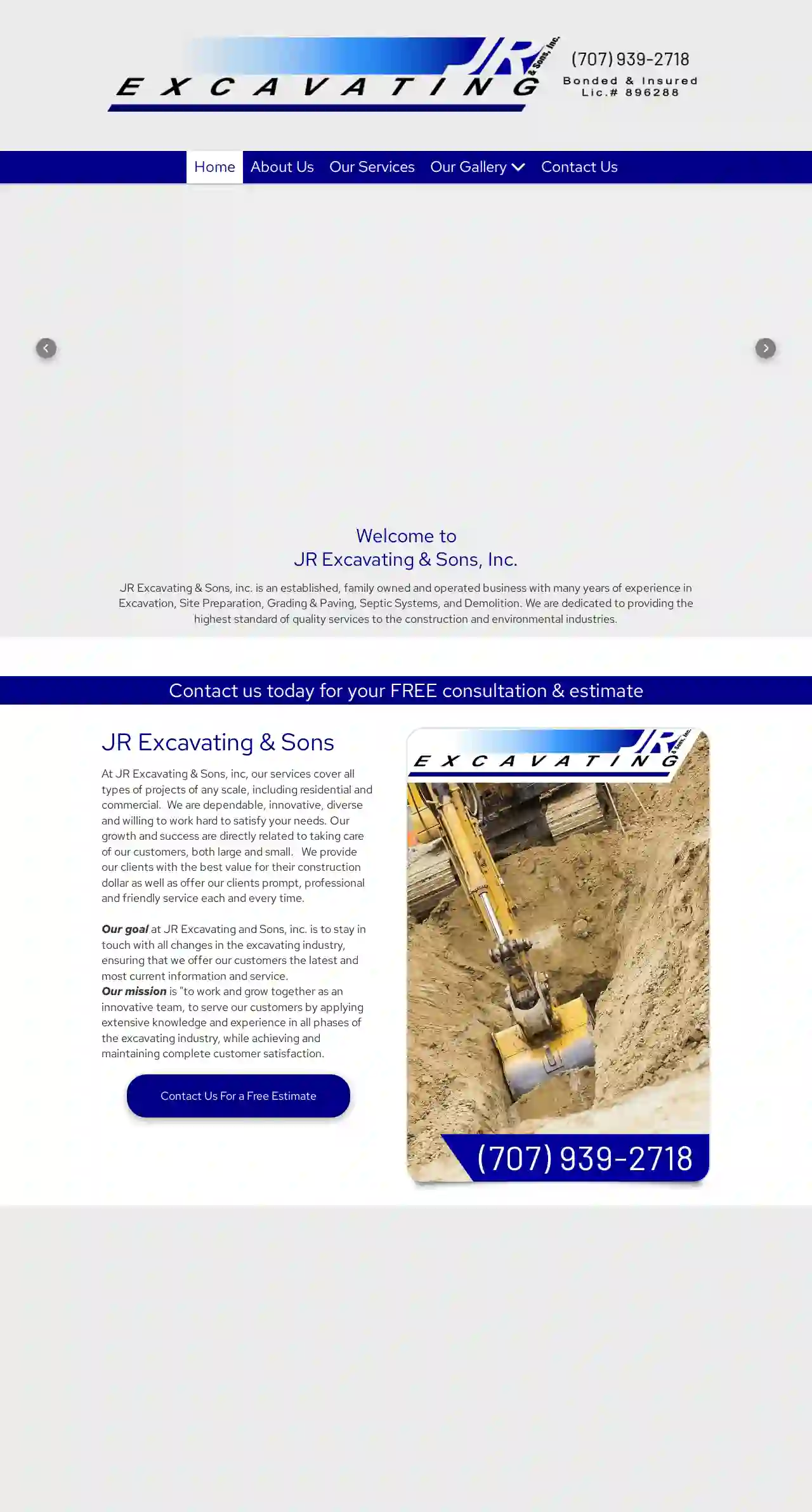
J R Excavating & Sons Inc
54 reviews120 Meadowlark Lane, Sonoma, 95476, USJR Excavating & Sons, Inc. is a family-owned and operated business with years of experience in excavation, site preparation, grading & paving, septic systems, and demolition. We are dedicated to providing the highest standard of quality services to the construction and environmental industries. Our services cover all types of projects of any scale, including residential and commercial. We are dependable, innovative, diverse and willing to work hard to satisfy your needs. Our growth and success are directly related to taking care of our customers, both large and small. We provide our clients with the best value for their construction dollar as well as offer our clients prompt, professional and friendly service each and every time. Our goal at JR Excavating and Sons, inc. is to stay in touch with all changes in the excavating industry, ensuring that we offer our customers the latest and most current information and service. Our mission is "to work and grow together as an innovative team, to serve our customers by applying extensive knowledge and experience in all phases of the excavating industry, while achieving and maintaining complete customer satisfaction."
- Services
- Why Us?
- Our Team
- Gallery
Get Quote
Valpo Excavation & Septic
1101 Cumberland Crossing Drive, Suite 223, 1101 Cumberland Crossing Drive Suite 223, Valparaiso, 46383, USValpo Excavation & Septic: Your Trusted Excavation Partner in Northwest Indiana At Valpo Excavation, we are dedicated to delivering exceptional service with every project. Our team boasts years of experience in professional excavation, grading, trenching, site preparation, septic installation & repairs, and a wide range of other services. We are equipped with the most reliable equipment and skilled professionals to handle any excavation, septic, and foundation needs. When you require groundwork in Northwest Indiana, we are your one-stop solution. We understand that site preparation is crucial for any construction project. We offer a comprehensive suite of services, from grading and trenching to foundation installation. Our team at Valpo Excavation & Septic has extensive experience in heavy construction and will execute your sitework with precision and efficiency. Valpo Excavation is a locally-owned and operated company founded by Russ Buechs, a man driven by the American Dream. Russ is a family-oriented businessman committed to providing a fulfilling life for his family. This dedication led him to establish this family-owned, faith-based company from the ground up. He built this company with honesty, trustworthiness, and integrity as core values. His mission is to provide solid foundations for every home and business throughout Northwest Indiana. From initial site preparation to the laying of foundations and utilities, Valpo Excavation can handle it all with expertise and reliability. For over 15 years, Russ has been a dedicated professional in heavy construction. He possesses experience in every stage of home building, from foundation work to gutter installation. Additionally, his multi-year mission work in Guatemala provided him with valuable experience in concrete pouring. Russ's diverse experience makes him highly knowledgeable and prepared to deliver exceptional results. At Valpo Excavation, we provide excavation services, sitework, clear cutting, trenching, land grading, flatwork, and foundation work for any home or business in Northwest Indiana. We collaborate with both contractors and individual homeowners or business owners. Whatever your excavation needs may be, we have the solution.
- Services
- Why Us?
- Gallery
Get Quote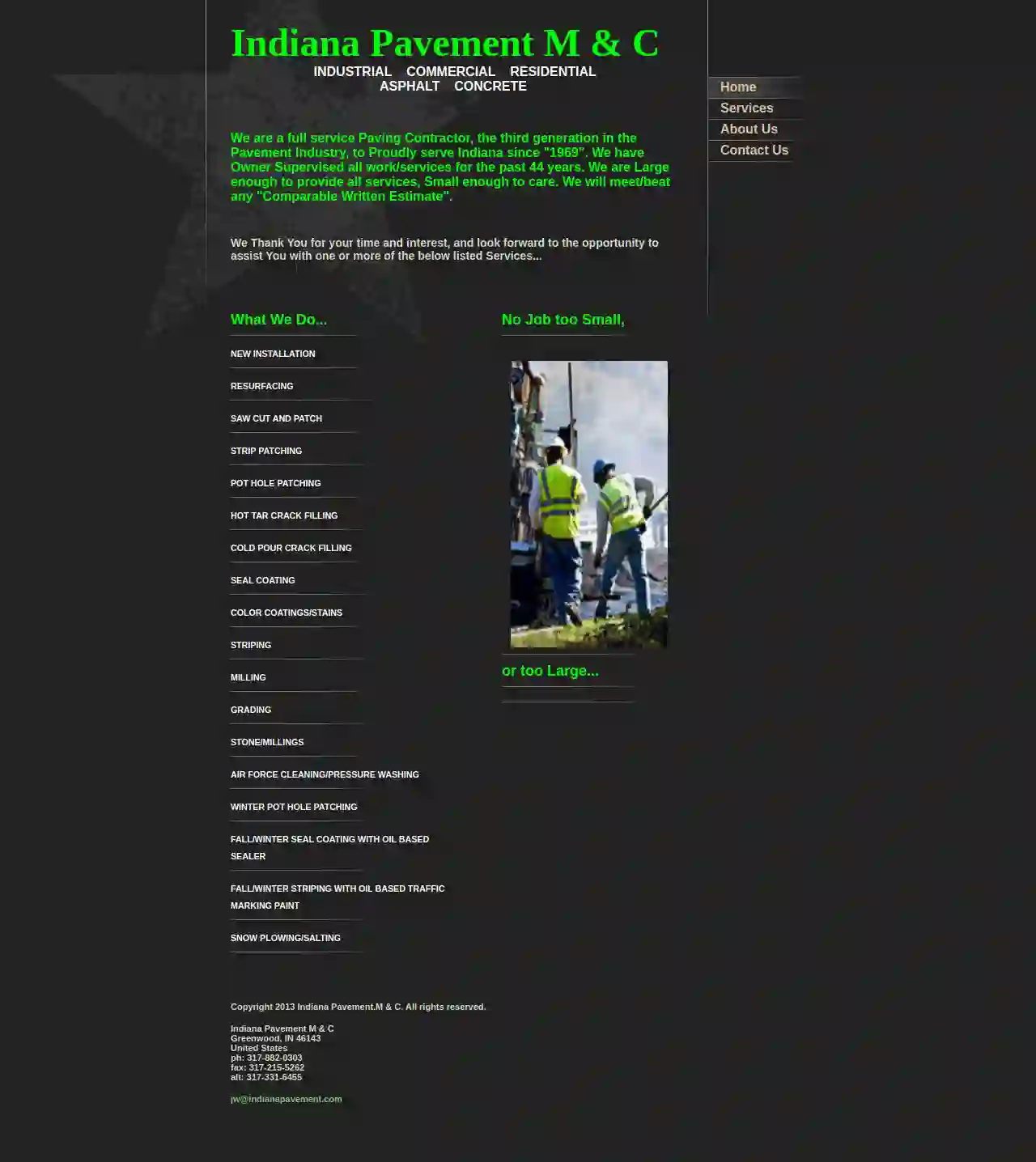
Indiana pavement M & C
4.325 reviewsGreenwood, 46143, USIndiana Pavement M & C: Your Trusted Paving Partner Indiana Pavement M & C is a family-owned and operated paving contractor with a rich history spanning three generations. Since 1969, we've been serving Indiana with pride, providing top-notch paving solutions for residential, commercial, and industrial clients. Our commitment to quality and customer satisfaction has earned us a reputation as a reliable and trustworthy partner in the pavement industry. We take pride in our owner-supervised approach, ensuring every project is completed to the highest standards. Our team is large enough to handle any project, yet small enough to provide personalized attention and care. We believe in transparency and offer competitive pricing, always striving to meet or beat any comparable written estimate. We are dedicated to providing a wide range of services to meet your specific needs. From new installations to repairs and maintenance, we have the expertise and experience to handle it all. We are committed to delivering exceptional results that enhance the beauty and functionality of your property. We understand the importance of protecting your investment. Our services, such as crack filling and seal coating, are designed to preserve your pavement and prevent costly repairs down the line. We are confident that our work will exceed your expectations and leave you with a lasting impression. Contact us today for a free consultation and estimate. We look forward to partnering with you on your next paving project.
- Services
- Why Us?
- Gallery
Get Quote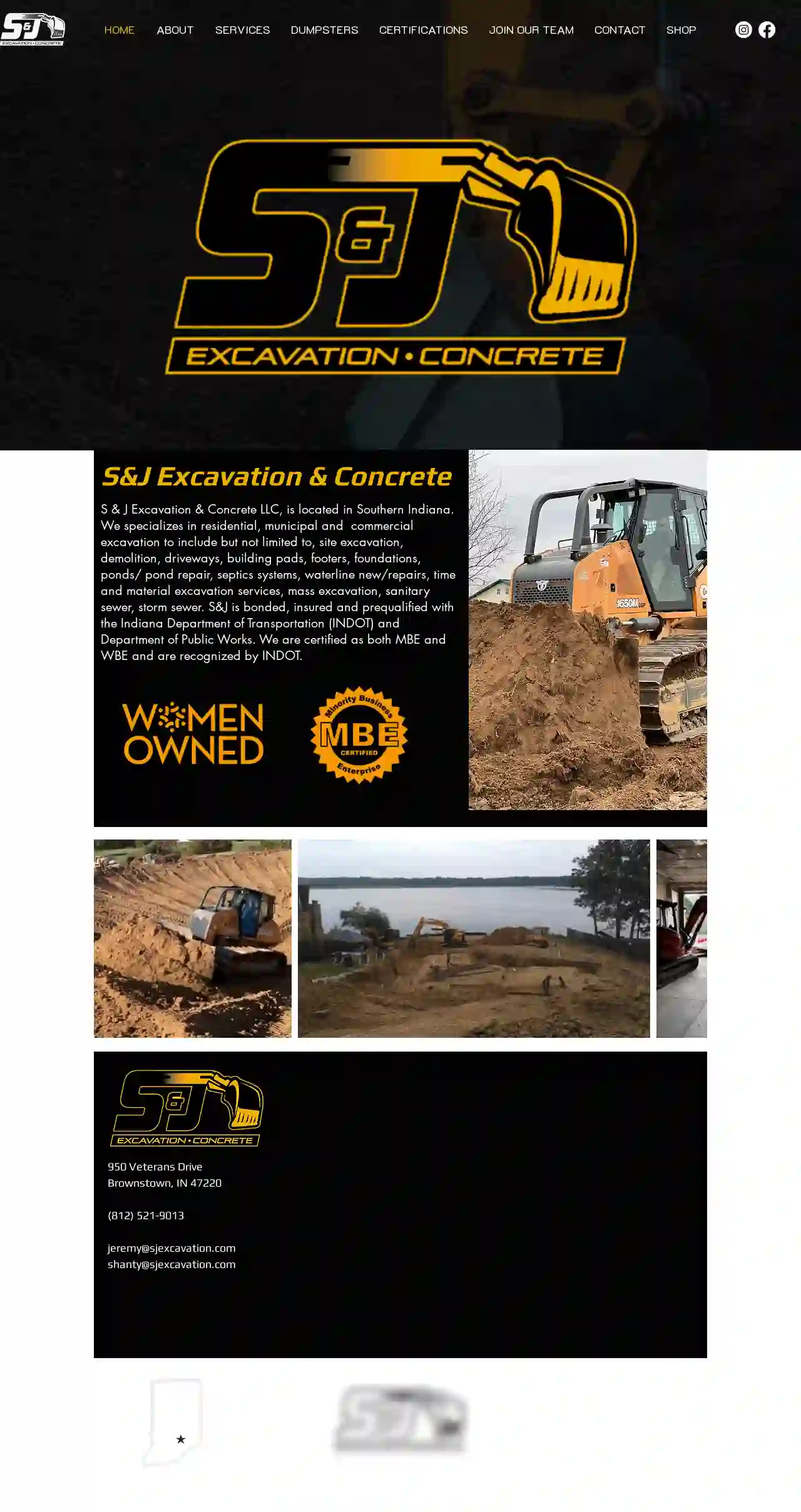
S & J EXCAVATION AND CONCRETE LLC
4.712 reviews950 Veterans Drive, Brownstown, 47220, USS&J Excavation & Concrete S & J Excavation & Concrete LLC, is located in Southern Indiana. We specialize in residential, municipal and commercial excavation to include but not limited to, site excavation, demolition, driveways, building pads, footers, foundations, ponds/ pond repair, septics systems, waterline new/repairs, time and material excavation services, mass excavation, sanitary sewer, storm sewer. S&J is bonded, insured and prequalified with the Indiana Department of Transportation (INDOT) and Department of Public Works. We are certified as both MBE and WBE and are recognized by INDOT.
- Services
- Why Us?
- Gallery
Get Quote
Minix Construction Company
1990 North California Boulevard Suit 20 PMB 1135, Walnut Creek, 94596, USWelcome to Minix Construction Company. We are a Mass Excavation, Shoring and Dewatering Company. Servicing depths of 50 feet deep. Our company has been in business since 1982, providing quality work to the entire bay area.
- Services
- Why Us?
- Gallery
Get Quote
Fehling Excavating and Land Clearing LLC
515 reviews14504 Wingate Rd, Moores Hill, 47032, USABOUT Fehling Excavating LLC is a family owned and operated company. We have built this company from the ground up and take the utmost pride in all our work. You can count on myself or my father Bill Fehling to be on every job site to ensure the work is done right. When you call, you will speak directly to either one of us and we will promptly provide you with the information you will need to get your project done in the timeframe in which you are looking to do it. We are a relationship-based company and thrive for customer satisfaction. No project is too big or too small. Every project receives the personal attention it deserves, from the planning phrase to completion. As experts in our fields, we believe in customer education as a top priority and, therefore, always strive to maintain a high level of communication throughout the process.
- Services
- Why Us?
- Testimonials
- Gallery
Get Quote
Excavation DHS
2035 Butte House Rd, Yuba City, 95993, USBegin Your Excavation Journey With DHS Explore the possibilities with Heavy Handyman Division. Contact us to receive a personalized excavation quote that meets your project's specific requirements, completely free of charge. Company Overview: At Heavy Handyman Division, we have been providing top-notch excavation and site preparation services since our inception. Our team is equipped with the knowledge and machinery to handle all your site work needs efficiently. Serving a wide area including Sacramento, Chico, Roseville, and many other locations within a 50 to 60-mile radius from Yuba City, California, we are your dedicated excavation specialists. We offer precise and environmentally conscious excavation services for both residential and commercial projects. Leveraging our expertise, we ensure your project is completed on time and within budget, exceeding your expectations.
- Services
- Why Us?
- Testimonials
- Gallery
Get Quote
Over 22,076+ Excavation Pros on our platform
Our excavation experts operate in Charlestown & surrounding areas!
ExcavationHQ has curated and vetted the Best Excavation Pros arround Charlestown. Find a trustworthy business today.
Frequently Asked Questions About Excavation Contractors
- New Construction: Laying foundations, basements, or underground utilities for new buildings.
- Home Additions: Creating space for new rooms, basements, or extensions.
- Landscaping: Leveling ground, creating slopes, installing retaining walls, or digging for ponds or pools.
- Drainage Improvement: Installing French drains, drainage ditches, or swales to manage water runoff.
- Utility Installation or Repair: Laying new water, sewer, gas, or electrical lines, or repairing existing ones.
- Demolition: Clearing debris and preparing the site after demolishing a structure.
- Clear the Area: Remove any obstacles, including vehicles, outdoor furniture, landscaping features, or structures, from the excavation zone and surrounding area.
- Mark Existing Features: Identify and mark underground utilities, septic tanks, sprinkler systems, or other buried elements you want to protect.
- Protect Landscaping: Use tarps or fencing to shield trees, shrubs, gardens, or other landscaping elements from damage.
- Provide Access: Ensure the excavation contractor has clear access to the work area, including gates wide enough for equipment.
- Discuss Logistics: Coordinate with the contractor regarding parking arrangements, material delivery, and any special instructions or concerns you might have.
- Experience: Choose contractors with a proven track record and years of experience in excavation projects similar to yours.
- Licensing and Insurance: Verify that they are properly licensed to operate in your area and carry adequate insurance to protect you from liability in case of accidents or damage.
- Equipment and Resources: Ensure they have the necessary equipment and resources to handle your project efficiently and safely.
- Positive Reviews and References: Check online reviews and testimonials from previous customers. Request references and contact them to inquire about their experience with the contractor.
- Professionalism: Opt for a company that communicates clearly, provides detailed and transparent estimates, and has a responsive and courteous team.
- Project Size and Scope: The larger and more complex the excavation, the higher the cost.
- Soil Type: Different soil types require different equipment and techniques, impacting costs. Rocky or clay-rich soil can be more expensive to excavate than loose soil.
- Accessibility: Difficult-to-access sites might require specialized equipment or additional labor, increasing expenses.
- Disposal Costs: Hauling away excavated material (soil, rocks, etc.) to disposal sites incurs additional fees.
- Permits and Inspections: Depending on local regulations, permits and inspections might be required, adding to the overall cost.
How do I know if I need excavation for my project?
How do I prepare my property for excavation?
How do I find a good excavation contractor?
How much does excavation cost?
How do I know if I need excavation for my project?
- New Construction: Laying foundations, basements, or underground utilities for new buildings.
- Home Additions: Creating space for new rooms, basements, or extensions.
- Landscaping: Leveling ground, creating slopes, installing retaining walls, or digging for ponds or pools.
- Drainage Improvement: Installing French drains, drainage ditches, or swales to manage water runoff.
- Utility Installation or Repair: Laying new water, sewer, gas, or electrical lines, or repairing existing ones.
- Demolition: Clearing debris and preparing the site after demolishing a structure.
How do I prepare my property for excavation?
- Clear the Area: Remove any obstacles, including vehicles, outdoor furniture, landscaping features, or structures, from the excavation zone and surrounding area.
- Mark Existing Features: Identify and mark underground utilities, septic tanks, sprinkler systems, or other buried elements you want to protect.
- Protect Landscaping: Use tarps or fencing to shield trees, shrubs, gardens, or other landscaping elements from damage.
- Provide Access: Ensure the excavation contractor has clear access to the work area, including gates wide enough for equipment.
- Discuss Logistics: Coordinate with the contractor regarding parking arrangements, material delivery, and any special instructions or concerns you might have.
How do I find a good excavation contractor?
- Experience: Choose contractors with a proven track record and years of experience in excavation projects similar to yours.
- Licensing and Insurance: Verify that they are properly licensed to operate in your area and carry adequate insurance to protect you from liability in case of accidents or damage.
- Equipment and Resources: Ensure they have the necessary equipment and resources to handle your project efficiently and safely.
- Positive Reviews and References: Check online reviews and testimonials from previous customers. Request references and contact them to inquire about their experience with the contractor.
- Professionalism: Opt for a company that communicates clearly, provides detailed and transparent estimates, and has a responsive and courteous team.
How much does excavation cost?
- Project Size and Scope: The larger and more complex the excavation, the higher the cost.
- Soil Type: Different soil types require different equipment and techniques, impacting costs. Rocky or clay-rich soil can be more expensive to excavate than loose soil.
- Accessibility: Difficult-to-access sites might require specialized equipment or additional labor, increasing expenses.
- Disposal Costs: Hauling away excavated material (soil, rocks, etc.) to disposal sites incurs additional fees.
- Permits and Inspections: Depending on local regulations, permits and inspections might be required, adding to the overall cost.